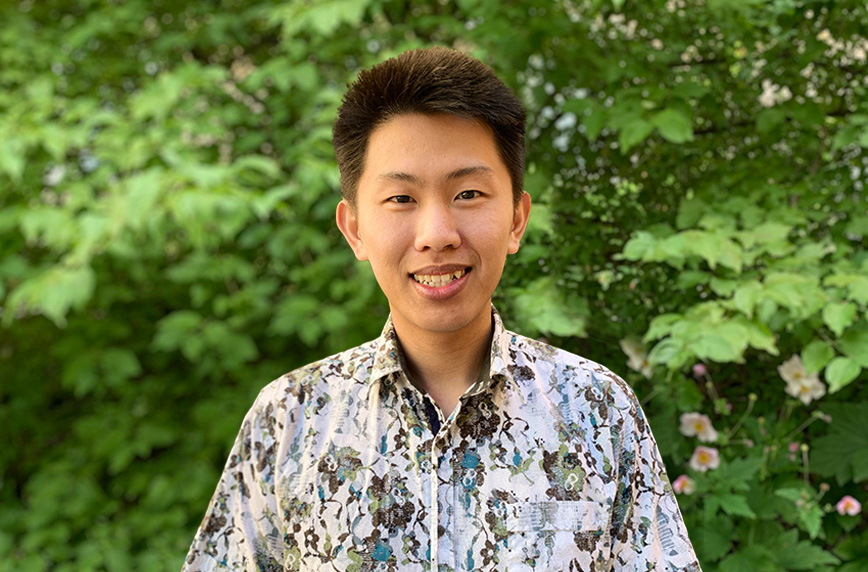Widi
Widi Suganda comes from Pekanbaru, Indonesia. He graduated with a Bachelor of Chemical Engineering at Institut Teknologi Bandung (ITB). Before continuing his master's studies at KTH, he worked at a pulp and paper company as a process specialist and project coordinator for the fibre line department. He enjoys strolling around the beautiful city of Stockholm during his free time.

Why did you choose this master’s programme at KTH?
I learned about this programme when the company I worked for launched a scholarship programme for talent development. Then, I started to find out the details about the KTH syllabus from web browsing and reaching out to students in the programme. With my interest in pulp and biorefinery, this programme will provide an interactive course to understand it deeper. Many methods and techniques in this industry come from the Fibre and Polymer Technology department, which is home to the Macromolecular Materials programme. I believe that studying at KTH is an important step which will enhance my professional career.
What are the best aspects of your programme?
Throughout the course, we got a chance to experience an interactive learning process where students are welcome to ask any question in order for both student and lecturer to grow together. Lecturers also keep updating the course material with the latest discovery. I am amazed to see research results from one year back from the course's date. Besides that, we also got to have study visits and guest lectures thanks to the close collaboration between KTH with industries and other research institutes.
Have you chosen a specialisation track within the programme?
I have chosen the Pulp and Fibre Technology track. I am interested in it since I believe wood and other biomass will be the new oil! The goal is to replace every product now derived from oil and other non-renewable resources with biobased raw material. It also aligns with the United Nations Sustainable Development Goals (UNSDG). I am very passionate about it and enjoy every course related to it.
What are some of your favourite courses so far?
My favourite course is Chemistry of biorefinery and Fibre technology – natural and synthetic fibres. In the chemistry of biorefinery, we got a chance to explore many biorefinery concepts and technologies for various biomass types, which is still a growing field. We also have a literature assignment presenting one hot topic in the biorefinery industry.
Fibre technology is also another course that I enjoyed. We have an entire lecture about fibre from its physical, chemical, and analytical perspective. This course is given by eight lecturers who are experts in each field from industry and research institutes. We also get a chance to do a study visit to the RISE Research Institutes of Sweden. We learned many new things and observed the smallest paper machine in terms of width for research purposes.
How do studies at KTH differ from your previous studies?
The education system where a semester is divided into two periods is one thing that is very different from my bachelor's university. Instead of learning 6 to 7 courses per semester, the Swedish education system only has 2 to 3 courses; this helps you to focus on the learning and gain a deeper understanding of individual courses.
How is student life in Stockholm?
Student life in Stockholm is pretty amazing. Studying at KTH has given me several opportunities to socialise with other international students and companies through several events organised by the Student Union, THS. As KTH is always put forward on inclusivity, you can always find the event with English as the primary language. Even though Stockholm is quite international, I believe in taking a free Swedish course provided by the Swedish government or KTH. Learning a new language will always be a plus to integrating into society. Furthermore, you can make more friends from different backgrounds and start practising Swedish together. Stockholm, in itself, is a beautiful city. The city integrates well with nature; if you are indoors, you can also find many museums and other entertainment spots to explore.
How would you describe your time at KTH so far?
KTH offers a perfect study environment which I have immensely enjoyed this far. Besides studying, I have joined a student organisation called Fibreteknologerna as an Event Manager. We collaborate with the Swedish forest industry to increase the awareness of KTH students in this field. I have also actively participated in THS Armada, Scandinavia's largest career fair, in 2021, where I worked as an Event host. This year, I am participating as an Event Team Leader. It is a fun activity where I can improve my networking and develop soft skills by working in a diverse team. I also got a chance to be a research assistant and summer worker in my department. This helped me prepare better for my thesis work.
What would you like to say to students thinking of choosing KTH for master’s studies?
KTH is an excellent institute with various good programmes. Choosing one of them can be challenging, but try to reflect on your future. Synchronise it with the programme details and syllabus. Convince that the programme matches your goals through discussion and feedback from current students. Believe me, studying at KTH may become the best decision of your life. So, what are you waiting for? Grab the opportunity, and I hope to see you in Stockholm.
